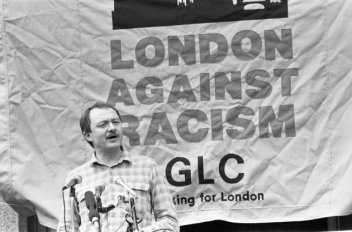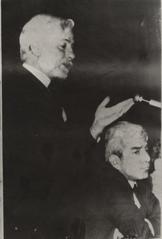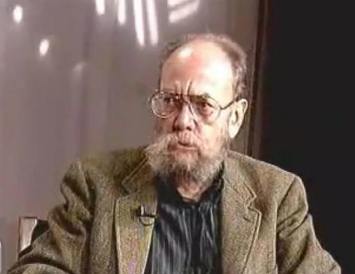My favourite political image among the protests and street activism that has marked the first three months of 2017 is a banner held on the St Patrick’s Day parade. It proclaimed:”More Blacks! More dogs! More Irish!” – mocking the daily racism of the 1960s when people looking for homes were confronted by openly discriminatory window signs rejecting applicants from these categories. The first Race Relations Act of 1968 finally knocked that appalling behaviour on the head, but not the sentiments behind it. It took another 20 years of grassroots campaigns led by victims of racism, finally aided by another layer of government, to normalise anti-racism and explicitly promote multiculturalism.

GLC leader Ken Livingstone addressing GLC London Against Racism rally 1984.
That layer of government was the Greater London Council (GLC). Under a visionary Left Labour leadership from 1981 it railed against continuing inequalities and discriminatory practices and the mindset supporting them – whether it was racist, sexist, homophobic or disablist. Through a generous grants programme it gave grassroots campaigners including Caribbean, African, South Asian, Irish and Jewish groups, the resources to make their voices count. The GLC also brought those groups and campaigns together through its Ethnic Minorities Unit, whose activities dovetailed with those of the GLC’s Women’s Committee. These policies were denounced at the time as “loony left” by the right-wing press. Maggie Thatcher felt so threatened by this equalities agenda that she dictatorially closed down the GLC.
The imagination and determination to push this agenda through was rightly identified very strongly with the GLC’s leader – one Ken Livingstone. In place of the old paternalistic grants policy which mainly favoured rather conservative existing groups, the GLC under Livingstone developed a grassroots strategy whereby innovative groups without resources were encouraged to identify a need in London, make a plan for addressing it, and ask the GLC to fund it.
I was a beneficiary, appointed as sole worker for the Jewish Cultural and Anti-Racist Project, a Jewish Socialists’ Group initiative funded by the GLC. Our two years of funding came to an end through Maggie’s act of destruction. But I remember a delicious moment one year in, when our project grant came up for renewal. Alongside other groups we were invited to the public gallery. Labour had a solid majority on the council, so at the meeting confirming renewal Ken Livingstone read through a list of groups that the Grants Committee had approved. The Tories could express their objection but they had no power to stop any of the approved grants going through. Most did so without objection but every so often – a lesbian project, or an Irish project – the Tory would say “We object!”. Livingstone read out “Jewish Socialists’ Group” in a manner which suggested he enjoyed the particular combination of those words as much as we did. The Tory rose: “We object”. Livingstone retorted, smiling, “You don’t like the name!”
How can it be that three decades on, the person who played such a pivotal role in the fight for equality came within a hairsbreadth of expulsion by the Labour Party for bringing the party in to disrepute over the issue of anti-Jewish racism, having made dubious comments about Hitler and Zionism; and for defending another MP’s comments, which she herself apologised for, after she recognised they had crossed a line into antisemitism?
The knee-jerk reaction of many left wingers, tired of cynical, manufactured and distorted accusations of antisemitism was to leap to his defence, Others who harboured doubts about the veracity of Livingstone’s comments and his tact were more reticent. He claimed that the real reasons he was threatened with expulsion were his support for Palestine and for Jeremy Corbyn. As someone who admired his earlier work, I’m not convinced. I believe that his controversial and completely unnecessary intervention – based on a very poor quality source – undermined Jeremy Corbyn and was detrimental to the Palestinian cause. It was also a free gift to right wingers in both the Labour and Conservative parties, and to pro-Zionist and pro-Conservative elements in the Jewish community determined to do Labour and Corbyn down.
They have been having a field day denouncing Labour for not expelling him, claiming that it proves that the Labour Party is not serious about tackling antisemitism, that the Jewish community has been let down by Labour’s disciplinary process and so on. Why pro-Conservative elements such as Jewish Board of Deputies president Jonathan Arkush, who rushed to congratulate Trump on winning the US election, or Chief Rabbi Mirvis who penned a vicious attack on Labour on the front page of the Daily Telegraph the day before London’s mayoral election while saying nothing about the Tories openly Islamopbhobic campaign against Sadiq Khan, feel they have the right to comment on Labour’s internal disciplinary processes is beyond me.
The bad blood between Livingstone and self-proclaimed Jewish leaders, however, goes back a long way. It is nothing to do with Israel/Palestine or Nazis, and it shows those “leaders” in a poor light. I will say more on that further down.
But those of us in the left and centre left of the Labour Party, who certainly do have the right to comment on those procedures, have every reason to be cynical about those individuals put in place under Tony Blair who still dominate the bodies enacting these disciplinary procedures. While they act against loose cannons such as Livingstone, they completely ignore the daily acts of Labour right-wingers, which bring the party into disrepute and harm its electoral chances. I am talking here of the likes of  Mandelson, Blair, Wes Streeting, Michael Dugher and Ruth Smeeth, who deliberately and repeatedly insult, demean and seek to undermine a Labour leader overwhelmingly elected twice to lead the party by its members. And they often take to the columns of the anti-Labour right-wing press to do so. They are surely the people who deserve to be at the front of any queue of those who might be legitimately charged with bringing the party into disrepute. In that context I am glad Livingstone was not expelled. And, indeed, rather than suspend him for a further year, maybe, as other Jewish left-wingers have suggested, he should be challenged to go for a year without mentioning Hitler.
Mandelson, Blair, Wes Streeting, Michael Dugher and Ruth Smeeth, who deliberately and repeatedly insult, demean and seek to undermine a Labour leader overwhelmingly elected twice to lead the party by its members. And they often take to the columns of the anti-Labour right-wing press to do so. They are surely the people who deserve to be at the front of any queue of those who might be legitimately charged with bringing the party into disrepute. In that context I am glad Livingstone was not expelled. And, indeed, rather than suspend him for a further year, maybe, as other Jewish left-wingers have suggested, he should be challenged to go for a year without mentioning Hitler.
But what is the real story with Livingstone and the Jewish community? What are the merits of what he has said, and the “academic” source he based them on? Did the timing of his intervention help or undermine Jeremy Corbyn at a time when Labour was being assailed with charges of antisemitism? Has it helped or hindered the Palestinian cause?
Livingstone took power in the GLC in 1981 at the same time as the Jewish Board of Deputies (BoD) was increasingly falling in with Thatcher’s government and its reactionary norms. Thatcher was extremely hostile to the GLC’s anti-racist agenda. Nevertheless the BoD initially co-operated with the GLC’s Ethnic Minorities Unit.
As Livingstone democratised and revolutionised the GLC’s grants procedures, a range of politically independent groups among both secular and religious Jews, including dissident and marginalised groups, applied for funding for their projects. The BoD, which saw itself as the sole legitimate political representative of Jews in Britain, wrote to Livingstone insisting on its right to vet any applications to the GLC for funding by Jewish groups. Livingstone quite rightly refused, on democratic grounds, and was never forgiven. As well as being involved with the Jewish Socialists’ Group’s (JSG) application, I was also part of a small group of four people called the Jewish Employment Action Group, which was taking up cases of antisemitism in the workplace. One of the four was a maverick member of the Board of Deputies. We asked for and received a grant of £220 (that’s all!). That maverick BoD member was hauled over the coals by the BoD’s paranoid leaders. Whenever the BoD got a hint that a particular Jewish group was applying for funds, it sent in unsolicited “references” to try to dissuade Livingstone’s GLC from funding them. I was shown the unsolicited “reference ” on the JSG, by the Grants Officer dealing with our application. It was a filthy document, full of lies and unfounded smears and allegations linking us to organisations described as “terrorist”. Fortunately the GLC disregarded it, but it revealed the BoD’s methods.
In 1983 the Board suspended its participation in the work of the GLC’s Ethnic Minorities Unit, an entity that was developing an imaginative, inclusive agenda for tackling all forms of racism in London and actively promoting multiculturalism. I have a leaked copy of the internal minutes from the BoD’s Defence Committee which agreed this action. It sets out five charges against the GLC, listed a to e, including: “The use of County Hall by pro-PLO factions and by terrorist representative groups”.

Avnery and Sartawi at GLC County Hall
In 1983 the GLC’s County Hall had indeed hosted the first public meeting in Britain in which an Israeli peace activist, Uri Avnery, shared a platform with a leading PLO representative, Issam Sartawi. I was among the organisers of the meeting. Also in the early 1980s the GLC hosted Sinn Fein members accused of direct links withe IRA.
However the leaked minutes explained that the BoD’s decision to break off relations with the GLC Ethnic Minorities Unit was taken because of (e), “a grant to the Jewish Socialists’ Group, against the advice of the Board”.
Following the initial skirmishes which were about the GLC being able to function democratically without unwanted and unwarranted interference from the BoD, there were further clashes which related also to pro-Palestinian comments that Livingstone made in the aftermath of the Lebanon war of 1982.
In that period, Livingstone was guilty of a misdemeanour which does link directly to much more recent controversies. He was one of the editors of a left-wing newspaper called Labour Herald which published very crude denunciations of Israel and cartoons of its very right-wing Prime Minister Menachem Begin dressed in Nazi uniform, which drew accusations of antisemitism. It also carried a review by one Harry Mullin of three publications alleging Zionist-Nazi collaboration. This review crossed a line from anti-Zionism to antisemitism. I was co-writer of a letter from the JSG, showing how this line had been crossed, and how it also served to diminish Nazi responsiblity for the Holocaust. Our letter demanded an apology from Labour Herald for publishing this review. The letter was published but no apology was made. In a private letter Livingstone remarked that Harry Mullin was a respected labour movement writer. It was no great surprise to me to learn that a few years down the line Harry Mullin had found his more natural home in the fascist British National Party, through which he increasingly peddled Holocaust denial. Perhaps this was an early hint of – at best – Livingstone’s lack of sophisticated judgement in this area.

Lenni Brenner
During the recent controversy, when Livingstone was pressed for the source of his claims that Hitler “was supporting Zionism… before he went mad and ended up killing six million Jews”, he told the Evening Standard, “Everything I said… was true and I will be presenting the academic book about that to the Labour Party inquiry.”. That “academic” source was Zionism in the Age of the Dictators, written in the early 1980s by Lenni Brenner, an American freelance journalist. Brenner’s book reads much more like tabloid journalism than any serious academic study. It makes crude allegations of Zionist-Nazi collaboration, treats the actions of some Zionists as representing all Zionists, and utterly distorts the power relations between Zionists and Nazis.
In truth, there were attempts by some Jews in Germany to make deals with the Nazi dictatorship that was hostile and repressive towards all Jews. In Germany’s case these were Zionists (an ideological minority among German Jews), who were criticised by other Zionists and other Jews for doing so. Further attempts to make deals with Nazi rulers were made by some Jews in Nazi-occupied Europe, but these attempts do not break down on simple Zionist/anti-Zionist lines. Some bourgeois Jews who were not Zionists also attempted to extract concessions from their oppressors, to save some lives through such deals. On the other hand, many left-wing Zionists participated in the anti-Nazi resistance, especially in the ghettoes. But, whatever deals were attempted in Germany after Hitler came to power, Hitler had already made crystal clear his absolutely poisonous hatred towards all Jews when he published Mein Kampf in 1925, and a second edition in 1926.
When Lenni Brenner came to London in 1983/84 to promote his book the Jewish Socialists’ Group was unimpressed with the publicity but nevertheless invited him to speak to one of our meetings about it. He gave an extremely crude analysis which tried to make facts fit very thin pre-ordained theories. When he was challenged on his “analysis” he reacted with aggression. When audience members argued that his comments were antisemitic he flew into a further rage and told us that he could not be racist or antisemitic because his wife was Black. That, I’m afraid, is the calibre of Livingstone’s prime source.
Of course, if you do serious research you can find many examples that would show that in terms of combating antisemitism and fascism, whether in Germany or, for example, in Poland Europe’s largest Jewish community pre-war, the 1930s and ’40s were not Zionism’s finest hour. And the willingness of Zionists to seek cooperation with the most reactionary regimes towards its goals has a long pedigree. It stretches as far back as Theodor Herzl’s meeting with Plehve, a minister in Tsarist Russia, a representative of the murderous oppressors of Jews, radicals and revolutionaries. Herzl promised Plehve, on no authority at all, that Jewish radicals and revolutionaries would cease their struggles against Tsarism for 15 years if he would give a charter for Palestine. Nothing came of it, but not for want of trying.
However, this whole effort to try to find evidence of Zionists behaving badly in the 1930s in order to expose the way Zionism behaves today, is such a poor way of supporting the Palestinians and their just demands. It rests on too many crude generalisations. You do not have to go back to Hitler and the 1930s in order to expose and challenge the oppression of Palestinians by Zionist ideology and practice today. As Shami Chakrabarti rightly pointed out in her report, from the Inquiry that followed in the weeks after Livingstone’s remarks, critics of Israeli policy could “use the modern universal language of human rights, be it of dispossession, discrimination, segregation, occupation, persecution and … leave Hitler, the Nazis and the Holocaust out of it”. I agree with her wholeheartedly. The case against Israel’s occupation and ill-treatment of the Palestinians is unanswerable. Trying to base that case on what some Zionists did in Germany in the 1930s will always end up diverting the argument towards accusations of antisemitism, and ultimately lets both the Israeli government and the Zionist movement in 2017 off the hook.

Bradford MP Naz Shah
Livingstone was also apprehended for his defence of tweets made by Bradford Labour MP Naz Shah, which were considered by Jewish “leaders” such as the BoD as offensive. The BoD apparently believes it has the sole right to define, on behalf of the community, what is offensive to all Jews. It does not have that right. One of Shah’s tweets recycled an innocuous old joke suggesting that Israel should solve its problems by relocating to America. It pokes fun at the mutually sycophantic relationship between Israeli and American governments over the last few decades in which Israel has served the interests of that superpower very well. My friend, the Jewish comedian Ivor Dembina, pokes fun similarly when he says in his shows, “I think Israel should give back the Occupied territories… but keep New York!” That is edgy but not antisemitic.
The only actually offensive, indeed antisemitic, tweet by Shah was in relation to an online poll regarding Israel’s war on Gaza in 2014, when she tweeted that “the Jews are rallying”. Not “Zionists”, not “supporters of Israel”, but “Jews”. That is antisemitic, and she rightly apologised.
The day after she did so, Ken Livingstone appeared on Vanessa Feltz’s radio show, of his own volition, to discuss this matter. The timing is crucial and tells us much again about Livingstone’s lack of judgment and his apparent desire for notoriety, whatever the cost to those whose causes he claims to be promoting. The London mayoral elections were approaching and the Tories were running an Islamophobic campaign against Sadiq Khan. If Livingstone had had the nous, he would have simply noted Shah’s acknowledgement that she had crossed a line into antisemitism, welcomed her apology and then used all the weight of his background in anti-racism in London to utterly condemn the Tories for their thoroughly racist campaign against Khan. That could, and should, have been the story. Instead he tried to excuse Shah’s tweets as “completely over the top but … not antisemitic”. Immediately after this came his infamous remarks about Hitler and Zionism.
Livingstone’s claims that he is being targeted partly because he supports Jeremy Corbyn don’t stack up well. Corbyn was under massive pressure on this issue from an unholy alliance of Blairites, the mainstream media, Jewish community “leaders” and Tories. A spokesperson for Corbyn had already welcomed Shah’s apology. Livingstone’s intervention further undermined Corbyn. And some who know him well have suggested that this was deliberate – whether for reasons of jealousy or some petty sectarianism.
I do not believe Livingstone is antisemitic. Nor do I believe that right-wing Jews whom the media treats as spokespersons have any right to define what is offensive to all Jews. I respect the integrity of the longstanding socialist and Labour Jewish activists who gave supportive testimony at Livingstone’s hearing, several of whom I know personally. However I do believe that Livingstone deliberately invites controversy and notoriety, that his judgement on these issues is very poor, that he has set back the Palestinian cause by his utterances, and made life more difficult for the embattled left-wing Labour leadership.
I hope that those of us fighting for justice for the Palestinians, fighting racism in all its forms, including antisemitism, and fighting to strengthen Labour’s progressive leadership will reflect on this episode and ensure that we are directing our fire on our enemies in ways that are both principled and effective.
Pingback: Hero or villain? The Livingstone question | poplarphilosophyproject
Reblogged this on Vacillating Element.
LikeLike
Thanks. The only sensible thing I have read about the who thing.
LikeLiked by 3 people
Good piece, well argued, but you omit something about the Brenner book (Zionism in the Age of the Dictators), which Ken cited as his source. I’ve never read it all the way through but on p.89 Brenner writes, that “Hitler’s theories on Zionism, including the Jews’ alleged inability to create a state, had been there in plain German, since 1926. The Zionists ignored the fact that Hitler hated all Jews, and that he specifically condemned their own ideology”. Brenner suggests that the Nazis exploited some Zionists for their own ends, and quotes a Gestapo agent telling a Jewish leader “There [in Palestine] we will catch up with you.”
So wherever Livingstone got the idea that “Hitler was supporting Zionism”, it would have been a very poor reading of Brenner’s book.
LikeLike
Please correct the typo. *Who’ should be ‘whole’. I was a bit to enthusiastic to send it off.
LikeLike
Pingback: Galloway’s Comment on Livingstone Affair is Unforgivable. | Tendance Coatesy
Reblogged this on Guy Debord's Cat and commented:
A thoughtful and refreshing analysis of the Livingstone Affair. Ken’s a goshite and that’s something we can all, hopefully, agree on. He is not, however, an anti-Semite. David Rosenburg was there at the dawn of the GLC Rainbow Coalition under Livingstone and is witness to some of the key events that have helped to shape the discourses surrounding Livingstone Affair.
LikeLike
Pingback: Ken Livingstone and Naz Shah | SHOAH
If the rest of this blog is half as good as this post then I’m very happy to have found it.
LikeLiked by 1 person
Very informative and amply demonstrates, if such demonstration was needed, that history is about class struggle.
LikeLike